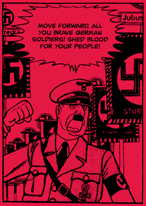
[ Metro | Metroactive Central ]
Master of the Manga
 War and Remembrance: A panel from Japanese comic-book artist Osamu Tezuka's story of WWII, 'Adolph' 'Adolph' shows why Osamu Tezuka was manga's top man By Richard von Busack "The god of comics" ("manga no kamisama"; it sounds less blasphemous in Japanese) is how Osamu Tezuka (1928-1989) was referred to in his native country. In prodigiousness and popularity, Tezuka had no rivals. His easily recognizable style complemented a range of subject matters, from science fiction to Buddhist allegory. It should be noted that in Japan, manga (comic books) are universally popular, available in inexpensive anthologies, and range in subject from satire to erotica to golf. Tezuka was considered the best of all the manga artists. One obituary for the master even claimed that Tezuka was the reason why comics have caught on in Japan--foreign countries, having no Tezuka, never would understand the essential appeal of comics. That may be, although in America we still have Will Eisner, who has lived long and worked hard chronicling everything from common people to masked superheroes. Eisner is, in Yankee eyes, a far better draughtsman than Tezuka. What we don't have here is a long tradition of great two-dimensional art--the peerless ukiyo-e (woodcuts)--to prepare us for the notion of comics being something besides disposable junk for kids. In America, fans have mostly seen Tezuka's work in animation, especially in the dubbed adventures of Tetsuwan Atom (Astro-Boy) and Jungle Taitei (Kimba, the White Lion), both favorites of many 1950s and 1960s kids. Kimba, a self-effacing lion monarch attended by a baboon wise man, appears to have been a strong, if uncredited, source for The Lion King. An introduction to Tezuka can be seen in Adolph: A Tale of the Twentieth Century (Cadence Books Graphic Novels; $16.95), a good English translation of the first part of Tezuka's opus, published in the mid-'80s. This ambitious story, laid out with Tezuka's usual cinematic style, chronicles the lives of three Adolphs bound together by a common first name. Two are children of German émigrés growing up in the port town of Kobe before WWII: one Jewish, the other the son of a Nazi official. The third Adolph is the most infamous of them all; and Hitler's early reign is seen through the eyes of Sohei Toge, a Japanese journalist in Berlin covering the 1936 Olympics. When Toge's brother turns up murdered, the journalist must try to unravel a conspiracy to find out who the killers are. Anti-Semitism is the key to the plot. The manga expert Frederik L. Schodt, who introduces this edition, explains that the Nazis' hatred of Jews didn't really extend to the Japanese during the war. Tezuka, who espoused the kind of deep antiwar convictions that could be expected from a person who lived through the fire-bombing of his home town (Osaka), naturally sees the stupidity of such prejudice. What Schodt doesn't mention, though, is that anti-Semitism is not unknown in current-day Japan, thanks, among other reasons, to the influence of Henry Ford, whose anti-Semitic works are still read by aspiring middle managers. Thus, Tezuka's work has more of an edge to it than might initially meet the eye. Content aside, the story immediately captures the reader's attention, as Tezuka, in his artistic prime, shows off the loose, pleasing, handsome style that made him the king of the manga. Behind natural-looking, graceful caricatures are adroit, obviously researched backgrounds. Tezuka's work embodies the great virtue of cartoons: simplicity that signifies, as if through shorthand, a wealth of information. If only there were a shorthand method when there are so many names to drop, but the month of March is full of cartooning events, beginning with the Alternative Press Expo (800/866-8929) on March 23 in San Jose. The three-year-old event brings together self-published and small-press cartoonists and zine people. Guests include favorites Colin Upton (Canada's answer to Harvey Pekar), Garret Izumi and Donna Barr, whose The Desert Peach follows the continuing adventures of Pfirsch Rommel, General Erwin's nellie brother. Coastal fans can meet some of the guests at Santa Cruz's Atlantis Fantasyworld's "Independence Day" signing on March 22: Shannon Wheeler (Too Much Coffee Man) and Barton Lash (of the witty Wolf and Byrd: Counsellors to the Macabre) will be on hand, and Atlantis promises to donate the money from the sale of their books to the Comic Book Legal Defense Fund. Finally, David Mack (Kabuki) will appear at Lee's Comics in Palo Alto on March 17. Jaded old workhorses rub shoulders with bright newer talents at the Wonder Con in Oakland the last weekend in April, among them Eisner himself. The San Diego International Comic Con takes place July 4-7 this year--and is not to be confused with the Republican National Convention, which is bringming its own cargo of costumed supervillains to the very same convention center later in the month.
[ Metro | Metroactive Central ] | ||||||||||||||||||||||||||||||
This page was designed and created by the Boulevards team.
Copyright © 1996 Metro Publishing and Virtual Valley, Inc.